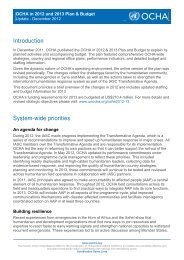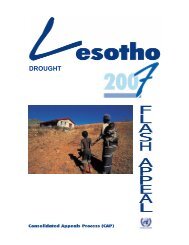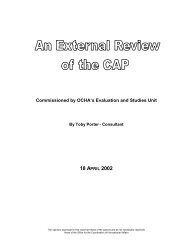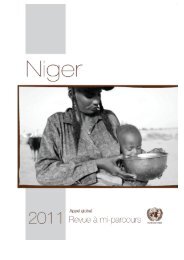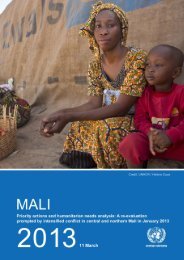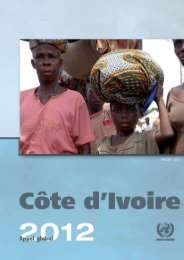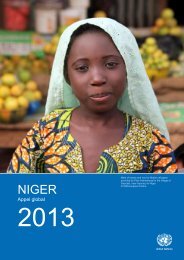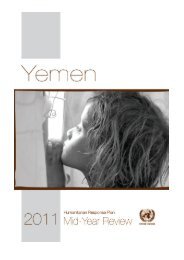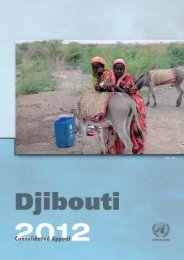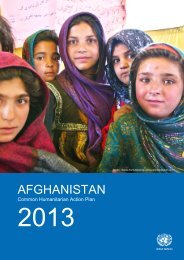SUDAN
Sudan: UN and Partners Work Plan 2012 - ReliefWeb
Sudan: UN and Partners Work Plan 2012 - ReliefWeb
- No tags were found...
Create successful ePaper yourself
Turn your PDF publications into a flip-book with our unique Google optimized e-Paper software.
United Nations and Partners[3] Humanitarian ACTION plan<strong>SUDAN</strong> WORK PLAN 201281Cross-cutting issuesIssues relevant to humanitarian activity cutting across all twelve sectorsThe humanitarian coordination system in Sudan has identifiedfour cross-cutting thematic issues that are particularly relevantto humanitarian activity across all twelve sectors.Each of the cross-cutting issues has a lead, indicated in thetable above, who is responsible for working closely with sectorleads to mainstream and incorporate the thematic issueswithin sector assessments, response plans and activities. Thisincludes a review and scoring of projects for the Work Plan toensure technical assistance on the implementation of specificprojects, and training and other knowledge sharing activitiesthroughout the year.GenderA major focus for the 2012 Work Plan is to ensure that thedistinct needs andexperiences of women, men, girlsand boysare adequately identified to inform delivery of humanitarianassistance.It is recognized that age and gender may be some ofthe defining characteristics of vulnerability and that to understandand address vulnerability, these aspects form a necessarypart of the needs analysis and the appropriate response.The absence of information disaggregated by gender and ageand othervulnerability factors has made it difficult to accuratelyreflect the specific needs of affected populations. Hence, thecollection, analysisand use of sex- and age-disaggregateddata (SADD) will be a priority assectors focus on targetingneeds assessments at those most vulnerable.To realize the commitment to incorporate the distinct needs ofwomen, girls, boys and men in all humanitarian action, OCHAhas deployed an IASC GenCap Gender Advisor on behalf ofthe United Nations Country Team (UNCT)/HCT to strengthenSudan’s capacity to undertake gender equality programming.The GenCap Advisor reviewed and provided analysis of the2011 Work Plan to assess how sectors performed with respectto mainstreaming gender.This analysis has informed the GenCap Advisor’s support tosectors in the 2012 Work Plan, including rolling out the GenderMarker, a practical tool to track the inclusion of gender inhumanitarian appeals processes, conducting training ongender mainstreaming to sectors and agencies, support toindividual sector leads and sectors on how to incorporategender into needs assessment, programme design and implementation,and advocacy to donors to prioritize gender inFunding by gender marker score, 2011Gender issues considered million $in project design1 No sign 115.832 In some limited way 40.113 Significantly 533.704 The principal purpose 0.995 Not specified 21.70Total 721.33[4][5]$721.33million[1][2][3]Cross-cutting issues leads and contact detailsCross-cutting issue Lead Contact informationGenderfunding. A total of 17 presentations on the Gender Markerand six sector/agency specific Gender Mainstreaming workshopshave been conducted to 573 humanitarian actors.For the 2012 Work Plan, approximately 54 percent of all 331projects received Gender Marker code 2a or 2b (51 percent:2a; and 3 percent 2b), illustrating that these projects aimedto promote gender equality in a significant way. A total of 44percent of projects scored a 1 and contribute in some way topromoting gender equality. At the other end of the spectrum,the number of gender blind projects was at 2 percent only),with some sectors also excluding projects that scored 0.Sectors’ interest to engage on gender issues is conducive tomore meaningful dialogue on how to move beyond cosmeticconsiderations of gender issues, undertake deeper genderanalysis that will result in equitable and gender responsivedelivery of humanitarian assistance.HIV/AIDSGenCap(housed in OCHA)The relative prevalence of HIV/AIDS, at just over one percentof people aged between 15 and 49,continued to be low inSudan and concentrated among two key populations – femalesex workers(FSW) and men having sex with men (MSM).However, results from andongoing bio-behavioural surveillance,suggests that HIV prevalence among FSW and MSM ishigher than earlier thought. In addition, there are relativelylow levels of knowledge of HIV prevention among the generalpopulation and at-risk groups. HIV testing and treatmentcoverage is also falling short of global targets.The UN and partners jointly continued supporting the NationalHIV/AIDS programmeduring 2011. This included the developmentof new National HIV/AIDS Strategy (2010-14) and accompanyingM&E Framework; inclusion of HIV/AIDS module inSHHS (2011); and an Integrated Bio-Behavioural Survey (IBBS)among at-risk populations. Efforts were also made to establishcommunity-basednetworks for raising awareness aroundHIVEarly RecoveryApril Phamphama@un.orgEarly Recovery UNDP Pontus Ohrstedt:pontus.ohrstedt@undp.orgEnvironment UNEP Altan Buttaltan.butt@unep.orgHIV/AIDS UNAIDS Mahboob Aminur RahmanRahmanM@unaids.orgEarly recovery is the application of development principlesin a humanitarian setting. These principles include: national




